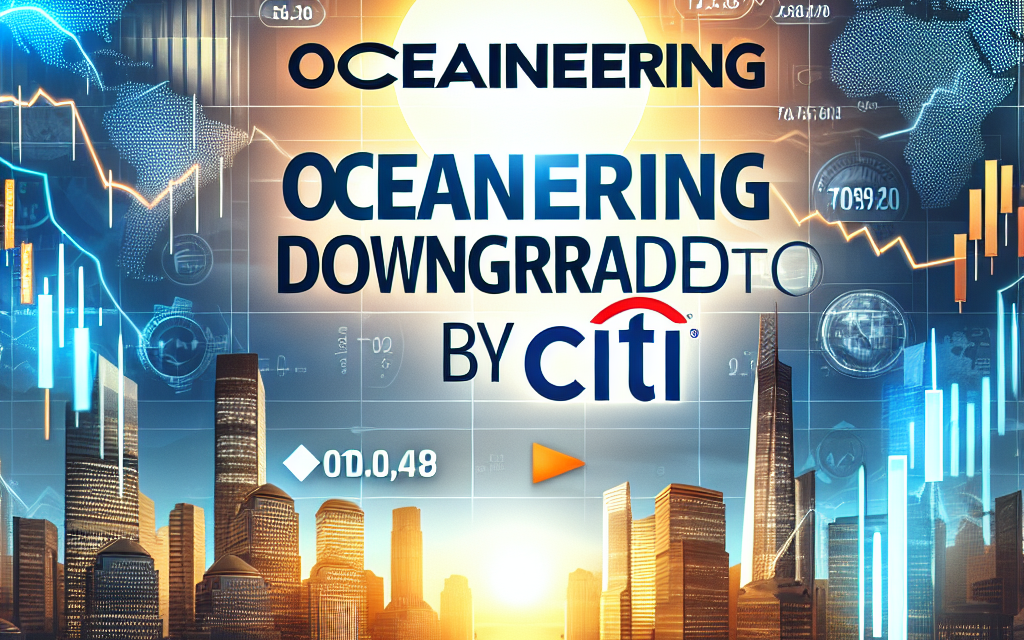“Oceaneering: Navigating New Waters as Citi Downgrades to Neutral.”
Introduction
Oceaneering International, a prominent provider of engineered services and products to the offshore oil and gas industry, has recently been downgraded to a “Neutral” rating by Citi. This decision reflects concerns over the company’s financial performance and market conditions, prompting analysts to reassess its growth potential and investment outlook. The downgrade may influence investor sentiment and market dynamics as stakeholders evaluate Oceaneering’s position in a fluctuating energy sector.
Oceaneering’s Downgrade: Key Reasons Behind Citi’s Decision
Oceaneering International, a prominent provider of engineered services and products to the offshore oil and gas industry, has recently faced a downgrade from Citi, which has shifted its rating from Buy to Neutral. This decision has raised eyebrows among investors and analysts alike, prompting a closer examination of the underlying factors that influenced Citi’s assessment. One of the primary reasons for this downgrade is the prevailing volatility in the oil and gas market, which has been exacerbated by geopolitical tensions and fluctuating demand. As global economies grapple with the aftereffects of the pandemic, the energy sector has experienced significant disruptions, leading to uncertainty in future revenue streams for companies like Oceaneering.
Moreover, Citi’s analysts have expressed concerns regarding Oceaneering’s financial performance in the near term. Despite the company’s efforts to diversify its service offerings and expand its market reach, the lingering effects of reduced capital expenditures by major oil companies have created a challenging environment. This situation has resulted in a slowdown in project awards and a backlog that is not as robust as previously anticipated. Consequently, the anticipated recovery in offshore spending may not materialize as quickly as hoped, prompting Citi to reassess its outlook for Oceaneering.
In addition to market conditions, the company’s operational challenges have also played a significant role in the downgrade. Oceaneering has been navigating through a complex landscape of rising costs and supply chain disruptions, which have impacted its ability to deliver projects on time and within budget. These operational hurdles not only affect profitability but also raise concerns about the company’s competitive positioning in an increasingly crowded marketplace. As competitors adapt to the changing dynamics of the industry, Oceaneering must demonstrate agility and innovation to maintain its market share.
Furthermore, Citi’s downgrade reflects a broader trend within the energy sector, where investors are becoming more cautious amid economic uncertainties. The shift towards renewable energy sources and the increasing emphasis on sustainability have led to a reevaluation of traditional oil and gas investments. As a result, companies like Oceaneering, which have historically relied on fossil fuel markets, may find it challenging to attract investment in a landscape that is rapidly evolving. This shift in investor sentiment underscores the need for Oceaneering to articulate a clear strategy for navigating the transition towards more sustainable energy solutions.
Despite these challenges, it is important to note that Oceaneering possesses several strengths that could support its long-term viability. The company has a strong reputation for technological innovation and has invested in advanced robotics and subsea solutions that could position it favorably in emerging markets. Additionally, as the global economy gradually recovers, there may be opportunities for Oceaneering to capitalize on increased offshore activity, particularly in regions where oil and gas exploration is expected to rebound.
In conclusion, Citi’s downgrade of Oceaneering to Neutral is a reflection of the complex interplay of market dynamics, operational challenges, and shifting investor sentiment within the energy sector. While the company faces significant hurdles in the short term, its commitment to innovation and adaptability may provide a pathway for future growth. As investors and stakeholders closely monitor Oceaneering’s performance, the company’s ability to navigate these challenges will be critical in determining its long-term prospects in an evolving industry landscape.
Impact of Citi’s Neutral Rating on Oceaneering’s Stock Performance
Citi’s recent decision to downgrade Oceaneering International, Inc. to a neutral rating has sparked considerable discussion among investors and analysts alike. This shift in outlook reflects a broader assessment of the company’s current market position and future prospects, particularly in the context of the fluctuating energy sector. As a leading provider of engineered services and products to the offshore oil and gas industry, Oceaneering’s performance is closely tied to the dynamics of oil prices and demand for subsea services. Consequently, the implications of Citi’s downgrade are multifaceted and warrant careful examination.
To begin with, the neutral rating suggests that Citi perceives limited upside potential in Oceaneering’s stock at this juncture. This assessment may stem from various factors, including the company’s recent financial performance, competitive landscape, and macroeconomic conditions. Investors often interpret such downgrades as a signal to reassess their positions, which can lead to increased volatility in the stock price. In the immediate aftermath of the announcement, it is likely that some investors may choose to liquidate their holdings, fearing that the stock may not perform as well as previously anticipated. This reaction can create downward pressure on the stock, potentially leading to a decline in market capitalization.
Moreover, the downgrade may influence the sentiment of institutional investors, who often rely on ratings from major financial institutions like Citi to guide their investment strategies. A neutral rating could prompt these investors to adopt a more cautious approach, thereby reducing their exposure to Oceaneering. This shift in sentiment can exacerbate the stock’s volatility, as institutional investors typically hold significant shares in publicly traded companies. As they adjust their portfolios in response to the downgrade, the resulting sell-off could further impact Oceaneering’s stock performance.
In addition to immediate market reactions, the downgrade may also have longer-term implications for Oceaneering’s strategic initiatives. A neutral rating could signal to management that the current trajectory may not be sustainable, prompting a reevaluation of operational strategies and capital allocation. For instance, the company may need to focus on cost-cutting measures or seek new revenue streams to bolster its financial health. This introspection could lead to a more conservative approach to growth, which, while prudent, may also limit the company’s ability to capitalize on potential opportunities in a recovering energy market.
Furthermore, the downgrade comes at a time when the energy sector is experiencing significant fluctuations due to geopolitical tensions, supply chain disruptions, and evolving energy policies. As such, Oceaneering’s management may need to navigate these challenges while also addressing investor concerns stemming from Citi’s assessment. The ability to effectively communicate a clear and compelling strategy to stakeholders will be crucial in mitigating any negative perceptions that may arise from the downgrade.
In conclusion, Citi’s downgrade of Oceaneering to a neutral rating is likely to have a pronounced impact on the company’s stock performance, influencing both immediate market reactions and long-term strategic considerations. As investors digest this news, the interplay between market sentiment, institutional behavior, and operational strategy will be critical in determining Oceaneering’s trajectory in the coming months. Ultimately, how the company responds to this rating and the broader market conditions will play a pivotal role in shaping its future performance and investor confidence.
Analyst Reactions to Oceaneering’s Downgrade by Citi
Oceaneering International, a prominent provider of engineered services and products to the offshore oil and gas industry, recently faced a downgrade from Citi, which has shifted its rating from Buy to Neutral. This decision has sparked a wave of reactions among analysts and investors, prompting a closer examination of the factors influencing this change. The downgrade reflects a broader sentiment regarding the challenges that Oceaneering may encounter in the current market environment, particularly as it navigates the complexities of fluctuating oil prices and evolving industry demands.
Analysts have pointed out that while Oceaneering has historically demonstrated resilience and adaptability, the recent volatility in the oil and gas sector poses significant risks. The downgrade by Citi is largely attributed to concerns over the company’s near-term growth prospects, especially in light of potential headwinds such as reduced capital expenditures from major oil companies. As these companies reassess their spending in response to market conditions, Oceaneering’s revenue streams could be adversely affected, leading to a more cautious outlook.
Furthermore, the downgrade has prompted analysts to reevaluate Oceaneering’s operational efficiency and project pipeline. While the company has made strides in diversifying its service offerings, including advancements in robotics and subsea technologies, the immediate impact of reduced demand for traditional services cannot be overlooked. Analysts have noted that the company’s ability to pivot effectively in response to market shifts will be crucial in maintaining its competitive edge. Consequently, the downgrade serves as a reminder of the importance of strategic agility in an industry characterized by rapid change.
In addition to these operational considerations, the broader economic landscape also plays a pivotal role in shaping analyst sentiment. The ongoing geopolitical tensions and their implications for global energy supply chains have led to increased uncertainty. As a result, investors are becoming more discerning, seeking clarity on how companies like Oceaneering will navigate these challenges. The downgrade by Citi reflects a cautious approach, emphasizing the need for investors to remain vigilant in assessing the potential risks associated with their investments in the energy sector.
Moreover, the reaction from other analysts has been mixed, with some maintaining a more optimistic outlook on Oceaneering’s long-term potential. These analysts argue that the company’s investments in innovation and technology could position it favorably as the industry gradually shifts towards more sustainable practices. They contend that Oceaneering’s expertise in subsea operations and its commitment to enhancing operational efficiencies may ultimately yield positive results, even in a challenging market.
As the dust settles from Citi’s downgrade, it is evident that the implications extend beyond mere stock ratings. The decision has ignited discussions about the future trajectory of Oceaneering and the broader energy sector. Investors are now tasked with weighing the potential risks against the opportunities that may arise as the industry evolves. In this context, the downgrade serves as a critical juncture, prompting stakeholders to reassess their strategies and expectations.
In conclusion, Oceaneering’s downgrade to Neutral by Citi encapsulates the complexities of the current energy landscape. While the company has demonstrated resilience in the past, the challenges posed by market volatility and shifting industry dynamics necessitate a more cautious approach. As analysts continue to monitor developments, the focus will remain on Oceaneering’s ability to adapt and innovate in a rapidly changing environment, ultimately determining its long-term viability and success.
Future Outlook for Oceaneering Post-Downgrade
Oceaneering International, a prominent provider of engineered services and products to the offshore oil and gas industry, has recently faced a downgrade to a neutral rating by Citi. This decision has raised questions about the company’s future outlook, particularly in light of the current dynamics within the energy sector. As investors and stakeholders assess the implications of this downgrade, it is essential to consider the broader context in which Oceaneering operates, as well as the specific challenges and opportunities that lie ahead.
To begin with, the downgrade reflects a cautious stance on Oceaneering’s near-term performance, particularly as the oil and gas industry grapples with fluctuating commodity prices and evolving market conditions. While the company has historically demonstrated resilience, the current environment poses significant challenges. For instance, the ongoing transition towards renewable energy sources and the increasing emphasis on sustainability have led to a reevaluation of investment priorities within the sector. Consequently, companies like Oceaneering must navigate a landscape that is not only competitive but also increasingly influenced by regulatory changes and technological advancements.
Moreover, Oceaneering’s reliance on the offshore oil and gas market makes it particularly vulnerable to shifts in demand. As major oil producers adjust their capital expenditures in response to market conditions, Oceaneering’s revenue streams may experience volatility. This uncertainty is compounded by the potential for geopolitical tensions to disrupt supply chains and impact global energy markets. Therefore, while Oceaneering has a solid track record of adapting to industry changes, the current climate necessitates a more cautious approach to growth and investment.
In light of these challenges, it is crucial for Oceaneering to focus on strategic initiatives that can enhance its competitive position. One potential avenue for growth lies in diversifying its service offerings beyond traditional oil and gas operations. By investing in emerging technologies and expanding into sectors such as renewable energy, Oceaneering could mitigate some of the risks associated with its current market reliance. Additionally, fostering partnerships with other industry players may provide access to new markets and innovative solutions, further strengthening the company’s portfolio.
Furthermore, Oceaneering’s commitment to operational efficiency will be paramount in navigating the post-downgrade landscape. By optimizing its cost structure and enhancing productivity, the company can improve its margins and better withstand market fluctuations. This focus on efficiency not only positions Oceaneering to respond to immediate challenges but also lays the groundwork for sustainable long-term growth.
As Oceaneering moves forward, effective communication with investors and stakeholders will be essential. Transparency regarding the company’s strategic direction and operational performance can help build confidence in its ability to adapt to changing market conditions. By articulating a clear vision for the future, Oceaneering can reinforce its commitment to delivering value, even in the face of uncertainty.
In conclusion, while the downgrade to neutral by Citi presents challenges for Oceaneering, it also serves as a catalyst for reflection and strategic realignment. By embracing innovation, diversifying its offerings, and maintaining a focus on operational excellence, Oceaneering can navigate the complexities of the energy sector and position itself for future success. As the company charts its course in this evolving landscape, stakeholders will be closely monitoring its progress and responsiveness to the myriad of factors that will shape its trajectory in the years to come.
Comparison of Oceaneering’s Performance with Industry Peers
Oceaneering International, Inc., a prominent player in the subsea services sector, has recently faced a downgrade to a neutral rating by Citi, a decision that has sparked discussions regarding its performance in comparison to industry peers. This downgrade reflects a broader analysis of Oceaneering’s operational metrics, financial health, and market positioning relative to other companies in the same field. To understand the implications of this rating, it is essential to examine Oceaneering’s performance alongside its competitors, particularly in the context of market trends and operational efficiency.
In recent years, the subsea services industry has experienced significant fluctuations, driven by varying demand for oil and gas exploration and production. Companies like TechnipFMC, Subsea 7, and Schlumberger have demonstrated resilience and adaptability in navigating these challenges. For instance, TechnipFMC has leveraged its technological advancements to enhance project execution and reduce costs, thereby improving its competitive edge. In contrast, Oceaneering has struggled to maintain similar momentum, as evidenced by its recent financial results, which have not met the expectations set by analysts and investors alike.
Moreover, Oceaneering’s reliance on the oil and gas sector has exposed it to the volatility inherent in commodity prices. While some of its peers have diversified their service offerings to include renewable energy solutions, Oceaneering has been slower to pivot, which may have contributed to its recent downgrade. This lack of diversification could hinder its ability to capitalize on emerging opportunities in the renewable energy market, a sector that is increasingly becoming a focal point for many industry players. As a result, Oceaneering’s performance appears less robust when juxtaposed with companies that have successfully integrated sustainability into their business models.
Additionally, operational efficiency is a critical factor in assessing performance within the subsea services industry. Companies like Subsea 7 have implemented innovative technologies and streamlined processes that have led to improved project delivery times and cost reductions. In contrast, Oceaneering has faced challenges in optimizing its operations, which has affected its profitability margins. This operational lag not only impacts its financial standing but also diminishes its attractiveness to potential clients who are increasingly seeking partners that can deliver projects on time and within budget.
Furthermore, investor sentiment plays a crucial role in shaping the market perception of these companies. The downgrade by Citi may reflect a broader concern regarding Oceaneering’s ability to compete effectively in a rapidly evolving industry landscape. In comparison, peers that have demonstrated consistent growth and adaptability have garnered more favorable investor sentiment, leading to stronger stock performance. This divergence in market perception underscores the importance of strategic decision-making and the need for Oceaneering to reassess its approach to remain competitive.
In conclusion, Oceaneering’s recent downgrade to neutral by Citi serves as a critical reminder of the challenges it faces in comparison to its industry peers. While the subsea services sector continues to evolve, companies that embrace innovation, operational efficiency, and diversification are likely to thrive. As Oceaneering navigates this complex landscape, it must address its operational shortcomings and explore new avenues for growth to regain its competitive footing. The path forward will require a concerted effort to align its strategies with market demands and emerging trends, ensuring that it remains a relevant player in the subsea services industry.
Investor Sentiment Following Oceaneering’s Neutral Rating
Oceaneering International, a prominent provider of engineered services and products to the offshore oil and gas industry, has recently faced a shift in investor sentiment following its downgrade to a neutral rating by Citi. This decision, which reflects a cautious outlook on the company’s near-term performance, has sparked discussions among analysts and investors alike regarding the implications for Oceaneering’s stock and overall market position. As investors digest this news, it is essential to consider the factors that led to this downgrade and the potential impact on the company’s future.
Citi’s downgrade stems from a combination of factors, including concerns about the volatility of oil prices and the broader economic environment. The oil and gas sector has been characterized by fluctuating prices, which can significantly affect the demand for Oceaneering’s services. As a result, investors are increasingly wary of the company’s ability to maintain consistent revenue growth in the face of such uncertainty. Furthermore, the ongoing geopolitical tensions and supply chain disruptions have added layers of complexity to the market, prompting analysts to reassess their expectations for companies operating within this space.
In light of these developments, investor sentiment has shifted from a more optimistic outlook to a more cautious stance. Many investors are now weighing the risks associated with Oceaneering’s business model, particularly as it relates to its exposure to the cyclical nature of the oil and gas industry. This shift in sentiment is evident in the stock’s performance, as shares have experienced increased volatility since the downgrade announcement. Investors are closely monitoring the company’s financial health and operational efficiency, seeking reassurance that Oceaneering can navigate the challenges posed by the current market conditions.
Moreover, the downgrade has prompted a reevaluation of Oceaneering’s strategic initiatives. The company has been actively pursuing diversification efforts, aiming to expand its service offerings beyond traditional oil and gas operations. However, the effectiveness of these initiatives remains to be seen, and investors are keen to understand how these strategies will translate into tangible results. As Oceaneering seeks to adapt to a changing market landscape, the success of its diversification efforts will be critical in restoring investor confidence and driving future growth.
In addition to these strategic considerations, the broader market sentiment towards the energy sector plays a significant role in shaping investor perceptions of Oceaneering. With increasing emphasis on renewable energy and sustainability, traditional oil and gas companies are facing mounting pressure to innovate and adapt. Investors are increasingly looking for companies that demonstrate a commitment to environmental, social, and governance (ESG) principles. As Oceaneering navigates this evolving landscape, its ability to align with these trends will be crucial in attracting and retaining investor interest.
In conclusion, Oceaneering’s downgrade to a neutral rating by Citi has undoubtedly influenced investor sentiment, leading to a more cautious outlook on the company’s prospects. As investors grapple with the implications of this rating, they are closely monitoring the company’s financial performance, strategic initiatives, and alignment with broader market trends. The path forward for Oceaneering will require a delicate balance of navigating current challenges while positioning itself for future growth in an increasingly competitive and dynamic environment. Ultimately, how the company responds to these pressures will determine its ability to regain investor confidence and thrive in the years to come.
Strategic Implications of Citi’s Downgrade for Oceaneering’s Operations
Citi’s recent decision to downgrade Oceaneering International, Inc. to a neutral rating has significant implications for the company’s operations and strategic direction. This downgrade reflects a cautious outlook on the energy sector, particularly in the context of fluctuating oil prices and evolving market dynamics. As a leading provider of engineered services and products to the offshore oil and gas industry, Oceaneering’s performance is closely tied to the health of this sector. Consequently, the downgrade signals potential challenges that the company may face in maintaining its competitive edge and achieving its growth objectives.
One of the immediate implications of this downgrade is the potential impact on investor sentiment. A neutral rating often leads to increased scrutiny from investors, who may reassess their positions based on perceived risks and opportunities. This shift in perception can affect Oceaneering’s stock performance, making it more challenging for the company to attract new capital for its projects. As investors become more cautious, Oceaneering may need to adopt a more conservative approach to its capital expenditures and operational investments, which could hinder its ability to innovate and expand its service offerings.
Moreover, the downgrade may compel Oceaneering to reevaluate its strategic priorities. In an environment where market conditions are uncertain, the company may need to focus on enhancing operational efficiencies and cost management. This could involve streamlining processes, optimizing resource allocation, and potentially reducing workforce levels in certain areas. While such measures may be necessary to maintain profitability in the short term, they could also limit the company’s capacity to invest in research and development, which is crucial for long-term growth and competitiveness.
In addition to internal adjustments, Oceaneering may also need to reconsider its market positioning in light of Citi’s downgrade. The energy sector is undergoing significant transformation, with increasing emphasis on renewable energy sources and sustainability. As traditional oil and gas operations face pressure from environmental regulations and shifting consumer preferences, Oceaneering has an opportunity to pivot towards more sustainable practices. By investing in technologies that support renewable energy initiatives, such as subsea solutions for offshore wind farms, the company could not only mitigate risks associated with its core business but also position itself as a leader in the evolving energy landscape.
Furthermore, the downgrade may prompt Oceaneering to strengthen its partnerships and collaborations within the industry. By aligning with other companies that share a commitment to innovation and sustainability, Oceaneering can leverage shared resources and expertise to navigate the challenges posed by the current market environment. Strategic alliances could also enhance the company’s ability to diversify its service offerings, thereby reducing its reliance on the volatile oil and gas sector.
In conclusion, Citi’s downgrade of Oceaneering to a neutral rating carries significant strategic implications for the company’s operations. As it navigates the challenges of a cautious investment climate, Oceaneering must focus on enhancing operational efficiencies, reevaluating its market positioning, and fostering strategic partnerships. By doing so, the company can not only weather the current uncertainties but also lay the groundwork for future growth in an increasingly competitive and dynamic energy sector. Ultimately, how Oceaneering responds to this downgrade will be critical in determining its long-term viability and success in a rapidly changing industry landscape.
Q&A
1. **Question:** Why was Oceaneering downgraded to Neutral by Citi?
**Answer:** Oceaneering was downgraded due to concerns about its financial performance and market conditions affecting its operations.
2. **Question:** What specific factors influenced Citi’s decision to downgrade Oceaneering?
**Answer:** Factors included declining demand in the oil and gas sector, increased competition, and potential challenges in achieving revenue growth.
3. **Question:** What was Oceaneering’s previous rating before the downgrade?
**Answer:** Oceaneering was previously rated as Buy by Citi.
4. **Question:** How did the market react to the downgrade of Oceaneering?
**Answer:** The market typically reacts negatively to downgrades, which may result in a decline in the stock price.
5. **Question:** What are the implications of a Neutral rating for Oceaneering?
**Answer:** A Neutral rating suggests that investors should hold their positions rather than buy or sell, indicating uncertainty about future performance.
6. **Question:** Did Citi provide a target price for Oceaneering following the downgrade?
**Answer:** Yes, Citi likely provided a revised target price reflecting their updated outlook on the company’s performance.
7. **Question:** What should investors consider following the downgrade of Oceaneering?
**Answer:** Investors should consider the overall market conditions, Oceaneering’s financial health, and any upcoming earnings reports or industry developments.
Conclusion
Oceaneering has been downgraded to a Neutral rating by Citi, reflecting concerns over the company’s near-term performance and market conditions. This decision suggests that analysts anticipate challenges that may hinder growth or profitability, prompting a more cautious outlook on the stock. Investors may need to reassess their positions in light of this downgrade and consider the potential risks associated with Oceaneering’s operations and market environment.





